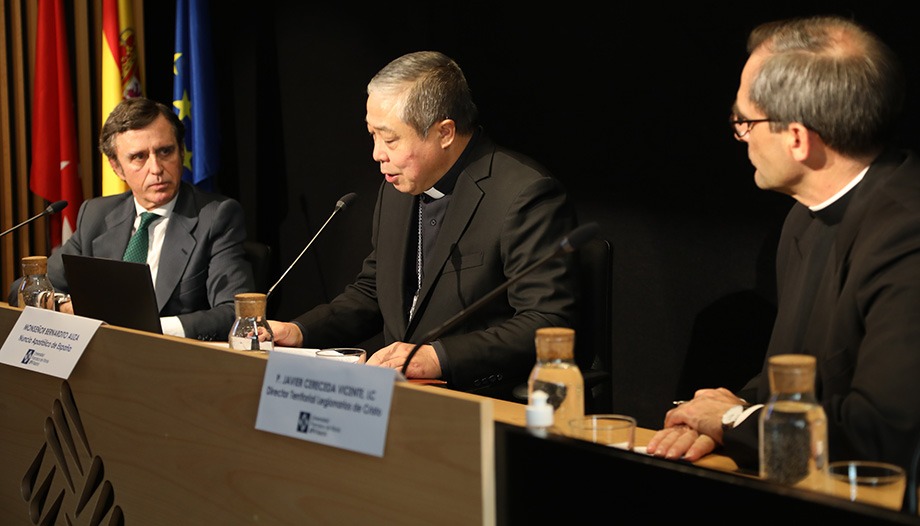The Nuncio to Spain, Archbishop Bernardito Auza, reviewed and commented on the documents in which recent Popes have referred to integral ecology, from St. Paul VI to Pope Francis' encyclical Laudato Si'.
The lecture of the Nuncio in Spain took place at the Francisco de Vitoria University (UFV), in the framework of the presentation of the VI Open Reason Congresswhich takes place every two years.
Reviewing "a concept used by John Paul II in 2001, which is also a central element of an integral ecology, ecological conversion," said Nuncio Auza, it can be seen that "integral ecology is for us, Catholic Christian believers, an ethical and moral question, and also a religious, spiritual one".
A conversion
"The foundation, the fundamental principle, because we have a shared responsibility, is the obligation to care for the environment, for creation. It is the moral and religious imperative. We are not going to take care of the environment because there is a problem. For us, whether there are more or less problems, we have a shared responsibility to take care of the environment, because we believe that this is the creation that the Lord has entrusted to us, to take care of, and also to enjoy, for our good. That is the foundation," he added.
"We can say," like St. John Paul II, the nuncio added, "that we have betrayed the Lord, who entrusted creation to us and we have not done well. This is the concept of conversion. With the awareness, already practically collective, that we have not done well, we have to go back, this is the concept of conversion, of this ecological conversion".
"We can say that we have to move away from certain behaviors, and convert to good behavior. The ecological crisis, for us, has to be considered also as a call to a profound inner conversion". "A conversion, and we are already in the moral and theological field as well", which "needs at least two actions: one of aversion, of fleeing, of turning away from behaviors".
What are we to be converted from? Nuncio Auza cited here some attitudes that the Pope offers us. "For example, rampant individualism, a culture of full and immediate gratification, greed, lack of moderation, lack of solidarity with those in need."
The second action is "the action of conversion, of change," he continued. "A movement towards the good. The Holy Father mentions shared responsibility in the care of creation, sobriety in the use of goods, and an ever more active participation in actions for the care of the environment."
"I think this is very timely today, because tomorrow we will begin Lent, the spiritual period of conversion. May our conversion also be beneficial for our common home, the planet", added Monsignor Bernardito Auza.
Holy See and Agenda 2030
The nuncio to Spain was introduced by the rector of the Francisco de Vitoria University, Daniel Sada, who asked the first question, on the Holy See and the 2030 Agenda. Monsignor Auza, in his lecture on integral ecology, had recalled the date of publication of Pope Francis' encyclical, Laudato sí', May 24, 2015.
"It was no coincidence that a document of such magnitude was published just in the last stages of the difficult intergovernmental negotiations of the 2030 Agenda.
The last few months were difficult, and Laudato si' came out, which was read by practically everyone. Its specific objective was in view of the Paris summit in December 2015".
"This document," the nuncio revealed, "has had and continues to have a very large and very positive impact on international environmental debates and policy. I am a witness to this having been present at all the conferences around the world, before the Paris Agreement, and before the 2030 agenda, especially in the decisive phases of the intergovernmental negotiations," he said.
Recalling Pope Francis' Address to the United Nations General Assembly in New York on September 25, 2015, was perhaps one of the reasons why the Nuncio took a bit of time to reply on the 2030 Agenda. And also, naturally, because Monsignor Auza worked in the Secretariat of State of the Holy See and later was Permanent Observer of the Holy See to the United Nations (UN), from 2014 until his arrival in Spain.
The Nuncio recalled that the Holy See has expressed its position on the 2030 Agenda on several occasions. It prominently includes the eradication of poverty and hunger, education, environmental challenges, and the promotion of peace, which the Holy See obviously shares. And there are two points (abortion and gender), on which it has expressed "reservations" in the process.
The 2030 Agenda did not finally include the term "abortion or a right to abortion," the nuncio said. As for the term "gender," included in point 5, "the Holy See understands the term gender on its biological basis: male and female." "We prefer other terms that capture the idea of power as service, rather than empowerment and empowering.
For example, to talk about promotion, to promote". The nuncio also pointed out that Spain may be the only country in the world where there is a Ministry for the 2030 Agenda.








